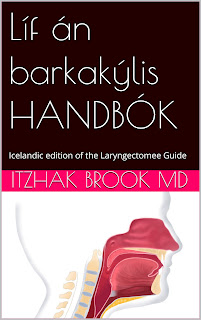- Among patients with non-T4, low nodal burden (T2N1 or T3N0-N1) disease, no survival differences were observed between CRT, PL, and TL.
- Patients who had non-T4, high nodal burden (T2-T3N2-N3) disease who underwent TL with or without adjuvant treatment had a higher risk of death compared with those who received CRT.
- No statistically significant difference in outcome was noted between CRT and PL for all stage groups.
Created by Itzhak Brook MD a physician and a laryngectomee. It contains information about head and neck cancer, life after laryngectomy, and manuscripts and videos about Dr. Brook's personal experiences as a patient with throat cancer. It has information about side effects of radiation and chemotherapy; methods of speaking; airway, mucus, stoma, voice prosthesis; eating and swallowing; medical, dental and psychological issues; respiration; anesthesia; travelling; and COVID-19.
"My Voice"
To obtain suggestions for laryngectomees how to cope with COVID-19 pandemic click the Laryngectomee Newsletter link.
Thursday, June 20, 2019
Comparing surgical and nonsurgical larynx-preserving treatments with total laryngectomy for locally advanced laryngeal cancer.
Sunday, April 28, 2019
Head and Neck Squamous Cell Carcinona ( HNSCC) is more common and advanced in those living with Human Immunodeficiency Virus (HIV)
- HPV infection is may be more prevalent in HIV+ patients.
- The HIV virus may have a direct oncogenic role in HHNSCC.
- HIV+ patients may present with HNSCC at a younger age and a higher stage.
- Lower CD4 count may predispose patients to HPV related HNCSCC.
- HIV + HNSCC+ have a poorer survival rates than HIV- HPV + .
- HNSCC patients who are HPV+ tend to have a more favorable outcomes regardless of HIV status.
Sunday, January 27, 2019
Use of nonsteroidal anti-inflammatory drugs improved patient survival for PIK3CA-altered head and neck cancer (HNC).
Saturday, September 1, 2018
Head and Neck Cancer: Through the Eyes of a Patient
Wednesday, August 15, 2018
"The Laryngectomee Guide” is available in 28 languages
The Guide provides practical information that can assist laryngectomees and their caregivers with medical, dental and psychological issues. It contains information about side effects of radiation and chemotherapy; methods of speaking; airway, stoma, and voice prosthesis care; eating and swallowing; medical, dental and psychological concerns; respiration; anesthesia; and travelling.
Links to obtain paperback, eBook, and Kindle Edition of the Guide in different languages:
English; paperback , Kindle, and eBook
Russian: paperback, and eBook
Turkish: paperback, and eBook.
Greek: paperback, and eBook
Bulgarian: paperback, and eBook.
Bosnian: paperback, and eBook.
Spanish (Spain edition): paperback and Kindle , and eBook.
Spanish language (Center America edition): paperback and Kindle.
Spanish (South America edition): paperback and kindle.
Portuguese: paperback, Kindle, and eBook.
French: paperback and Kindle , and eBook.
Persian (Farsi) : paperback, eBook.
Korean: paperback, and eBook.
Japanese: paperback, eBook, and kindle.
Filipino (Tagalog): paperback, and eBook.
Indonesian: paperback, and eBook.
Traditional Chinese: paperback, eBook and Kindle.
Simplified Chinese: paperback in China and paperback from Lulu, and eBook
Links to obtain FREE eBook of the Guide:
Russian click this link.
Turkish click this link.
Greek click this link
Italian click this link.
Spanish (Andine edition) click this link.
Spanish (Spain edition) click this link.
Spanish (Central America edition) click this link
Spanish (South America edition) click this link.
Portuguese click this link.
French click this link.
Persian (Farsi) click this link.
Korean click this link.
Japanese click this link.
Filipino (Tagalog) click this link.
Indonesian click this link.
List of sites to download the Laryngectomee Guide in 24
languages from Otolaryngological and Speech pathology Societies
The Guide is available for viewing and free download at the
American Academy of Otolaryngology-Head and Neck Surgery and
the Society of Otorhinolaryngology and Head-Neck Nurses, Inc
https://www.entnet.org/sites/default/files/LaryngectomeeGuide.pdf
https://www.entnet.org/content/laryngectomee-guide
American Speech-Language-Hearing Association
https://www.asha.org/PRPSpecificTopic.aspx?folderid=8589943346&section=Resources
International Association of laryngectomees
https://www.theialvoice.org/the-laryngectomee-guide
International Federation of Head and Neck Oncology
https://ifhnos.net/whncd/Index/Video
British Association of Oncologist
https://bahno.org.uk/clinicians_area/publications.aspx
Hungarian Ear, Nose, Throat and Head and Neck SurgeryMedical Association
Romanian Society of Otolaringology and Cervico-FacialSurgery
http://www.sorlccf.ro/index.php/ro/
Caen University Hospital, France,
http://orl-chu-caen.fr/
Association of Speech Pathologist, Associação Portuguesa deTerapeutas da Fala
German Society of Otolaryngology, Head and Neck Surgery,
Japanese laryngectomee Society,
Asociacion Espaniola de Logopedia, Foniatria, y Audiologia,
http://www.aelfa.org/noticia.asp?idc=1&idn=221&
Italian otolaryngology and Ophthalmology Association
http://www.aooi.it/altri-manuali/
Clinical Research Organization Association of Turkey
Taiwan Head and Neck Surgery, Society of Otolaryngology Head
& Neck Surgery http://www.thns.org.tw/medicine/
Society of Head and Neck Surgery of Singapore
Mexican Society of Surgical Oncology,
http://www.soqmexico.org/publicaciones
Brazilian Society of Clinical Oncology,
Brazilian Group of Head and Neck Cancer,
http://www.gbcp.org.br/informacoes-ao-paciente/
Brazilian Oral and Throat Cancer Association,
https://www.acbgbrasil.org/links-interessantes/
Brazilian Society of Speech Therapy, and Make SenseCampaign,
https://www.sbfa.org.br/portal2017/themes/2017/departamentos/artigos/materiais_28.pdf
Bulgarian Society of Oto-rhinolo-laringology,
Hellenic Society for Head & Neck Cancer (in Greek) Speak
and Language Pathology Society of Greece
http://headneckcancer.gr/el/odigos-gia-ton-astheni-me-laryggektomi-i/
New Zealand Society of Otolaryngology and Head and NeckSurgery Inc.
https://www.otorinolaryngologie.cz/vzdelavani/informacni-zdroje/
Israeli Society of Speech and language pathologist (Ishla)
https://ishla.org.il/forum-and-articles/%D7%9E%D7%90%D7%9E%D7%A8%D7%99%D7%9D/
Russian language Guide Turkish language Guide

































